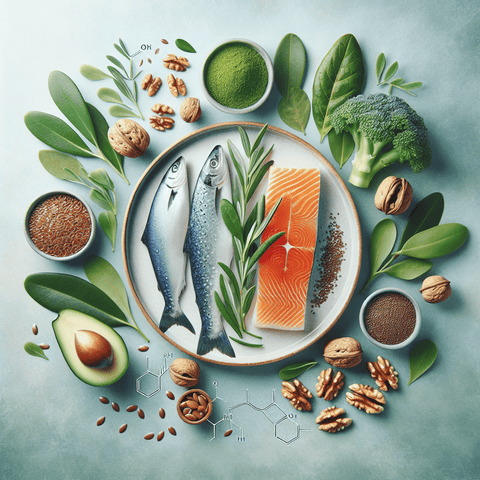Introduction
Omega-3 fatty acids are essential building blocks of good health. They play a vital role in maintaining heart function, brain integrity, vision, inflammation control, and even mood balance. As they cannot be synthesized by the human body, omega-3s must be obtained through diet or nutritional supplementation. Despite widespread awareness of their benefits, many people still fall short of the recommended intake.
Omega-3s are found in a variety of natural foods—particularly fatty fish—but are also available in plant-based forms and high-quality supplements. Whether you follow a traditional diet or a vegan lifestyle, achieving optimal omega-3 intake is possible through informed choices.
In this comprehensive guide, we will discuss the best food sources of omega-3, including fish, seeds, nuts, and oils, alongside supplement options like fish oil and algal oil. We'll also explore how each source contributes to your health, what to consider when supplementing, and how much you really need each day. Understanding these factors can help you support cardiovascular wellness, cognitive performance, and overall vitality.
Let’s dive into the world of omega-3s and discover which foods and supplements can empower your wellness journey today.
1. Omega-3 Foods and Nutritional Supplements: Essential Sources for Optimal Health
Omega-3 fatty acids are a group of polyunsaturated fats essential for various physiological processes. They are particularly known for their roles in cellular membrane health, hormone production, immune function, and neurological development. The three main types of omega-3s important to human health are:
- Alpha-linolenic acid (ALA) – primarily found in plant sources like flaxseed and walnuts.
- Eicosapentaenoic acid (EPA) – found primarily in marine sources like fish and fish oil.
- Docosahexaenoic acid (DHA) – also sourced from fish, critical for brain and eye development.
Incorporating omega-3-rich foods and supplements into your diet is essential for maintaining both daily health and long-term wellness. The European Food Safety Authority (EFSA) acknowledges the importance of EPA and DHA in supporting normal heart function, provided you consume at least 250 mg per day. DHA also contributes to maintaining normal brain function and vision at similar intake levels.
However, not everyone can consume enough through diet alone. That’s where nutritional supplements come in. A high-quality omega-3 supplement can help you meet daily needs without the complications of planning and preparing omega-3-rich meals daily. Supplements also offer a measure of purity and concentration, ensuring consistent dosing.
Whether you're looking to support joint flexibility, cardiovascular wellness, or cognitive performance, omega-3 supplementation alongside a healthy diet can serve as a reliable cornerstone for your nutrition strategy. At TopVitamine.com, a variety of omega-3 supplements are available to suit every lifestyle, including traditional fish oil and vegetarian alternatives.
2. Fish Oils: The Classic Omega-3 Supplement Powerhouse
Fish oil is arguably the most well-known and extensively researched omega-3 supplement. Its popularity stems from its dense concentration of EPA and DHA, the two most bioavailable forms of omega-3 fatty acids. Fish oil is typically extracted from fatty fish such as salmon, sardines, anchovies, mackerel, and herring. These species are not only rich in omega-3s, but also have relatively low levels of mercury compared to larger fish.
Fish oil supplements are available in various forms, including triglyceride, ethyl ester, and phospholipid forms. The triglyceride form is natural and often well-absorbed, whereas ethyl ester forms are more concentrated. The key variables to look for in fish oil supplements are EPA and DHA content per capsule, purity, absence of heavy metals, and sustainable sourcing.
Benefits of Fish Oil Supplements:
- Supports normal heart and brain function when taken in appropriate amounts.
- May help maintain healthy vision and joints as part of a balanced diet.
- Convenient and consistent intake of EPA and DHA.
Despite these benefits, it's worth noting possible drawbacks. Some users report gastrointestinal discomfort, especially when taking supplements on an empty stomach. There’s also the risk of oxidation; therefore, quality control, proper packaging, and antioxidant inclusion (like vitamin E) are essential.
When shopping for a fish oil product, choose high-purity supplements that confirm third-party testing for contaminants such as mercury, PCBs, and dioxins. We recommend reviewing and purchasing options from TopVitamine.com’s DHA & EPA Omega-3 collection to ensure premium quality products.
3. Plant-Based Omega-3 Sources: An Alternative for Vegetarians and Vegans
For vegetarians and vegans, incorporating omega-3s can be more challenging due to the absence of marine consumption. However, numerous plant-based foods are rich in the omega-3 fatty acid ALA. While ALA must be converted into EPA and DHA in the body, conversion rates are relatively low—estimated between 5% and 15% for EPA and less than 5% for DHA. Despite this, consistent intake of ALA-rich foods, combined with DHA/EPA-specific supplementation, can close the gap.
Top Plant-Based Sources of ALA:
- Flaxseeds and flaxseed oil – Among the richest plant sources of ALA.
- Chia seeds – Also offer fibre and protein benefits.
- Walnuts – Delicious, versatile, and a heart-healthy snack.
- Hemp seeds – Rich in omega-3, magnesium, and protein.
To maximize the intake of plant-derived ALA, consider grinding flaxseeds for better absorption, integrating chia seeds into smoothies, and using flaxseed oil as a salad dressing (avoid heating to preserve nutrient integrity).
For those who want to ensure adequate EPA and DHA levels, algae-based supplements are an excellent addition. These are derived from marine algae and offer a vegan-friendly source of EPA and DHA. For daily convenience and dietary certainty, visit our curated list of supplements at TopVitamine.com.
4. Omega-3 Fatty Acids: The Essential Nutrients for Brain and Heart Health
Understanding omega-3’s roles begins with distinguishing the different types: ALA, EPA, and DHA. While ALA can be converted into other forms, it's EPA and DHA that deliver the full range of physiological benefits.
Health Benefits of Omega-3 Fatty Acids:
- Brain Function – DHA is a primary component of brain tissue. It supports memory, learning, and overall cognitive performance.
- Cardiovascular Wellness – EPA and DHA help maintain normal heart function. EFSA notes beneficial effects with a daily intake of 250 mg EPA and DHA combined.
- Visual Acuity – DHA contributes to the maintenance of normal vision.
- Inflammation Regulation – Omega-3s modulate inflammatory processes, supporting joint health and immune balance.
Despite omega-3’s broad benefits, intake statistics remain suboptimal worldwide. Guidelines suggest a general recommended daily intake ranging from 250 mg to 500 mg of combined EPA and DHA for general well-being. For people with specific health concerns or pregnancy, requirements might be higher.
To bridge the gap between dietary inconsistency and nutritional need, high-quality supplementation becomes crucial. A comprehensive approach—combining high omega-3 foods such as salmon, and support from supplements—ensures you meet daily targets for optimal cognition, heart function, and metabolic health.
Explore premium omega-3 supplements tailored to your wellness needs by visiting our DHA & EPA Omega-3 supplement page.
5. DHA and EPA-Rich Foods: Focused Sources for Optimal Benefits
DHA and EPA are long-chain omega-3 fatty acids found predominantly in marine sources. Unlike ALA, no conversion is required, making them more bioavailable and beneficial per gram consumed.
Top Foods Rich in EPA and DHA:
- Salmon – One of the richest sources, with up to 1500 mg of EPA/DHA per 100g.
- Sardines – Affordable, nutrient-dense, and low in mercury.
- Mackerel – Known for its rich omega-3 content and flavor profile.
- Herring and Anchovies – Nutrient-rich and sustainable choices.
These foods are essential not only for taste but also for how efficiently they deliver omega-3s. However, some individuals may avoid them due to allergies, dietary preferences, or sustainability concerns.
When comparing food vs. supplement sources, it’s important to consider bioaccumulation risks like mercury in larger fish. Opting for smaller fish or purified supplement forms can mitigate this. Supplements also provide exact dosages and convenience.
To include EPA and DHA in your diet without risk, combine regular intake of fatty fish with certified supplements. Access trusted sources from our omega-3 collection at TopVitamine.com, where each supplement is tested for quality and purity.
6. Vegetarian Omega-3 Options: Meeting Nutritional Needs Without Fish
For individuals following a vegetarian or vegan diet, fish-based omega-3s are not an option. However, science and innovation have introduced plant-based alternatives offering EPA and DHA—primarily in the form of algal oil. Marine microalgae are the original sources of DHA in the food chain; fish accumulate it by consuming them.
Benefits of Algal Oil Supplements:
- Provides direct EPA and DHA intake.
- Free from ocean contaminants like mercury or PCBs.
- 100% vegetarian and vegan-friendly.
Algal supplements are often used during pregnancy and breastfeeding, as DHA plays a role in fetal brain and eye development. Many prenatal supplements now include algal DHA for this reason. Moreover, pairing algal oil with foods high in ALA, such as hemp or flax, ensures a well-rounded omega-3 profile for those avoiding animal products.
Future trends suggest that algal oil and fortified foods will expand access to these crucial nutrients. Ongoing research is exploring further plant-based biotechnology advancements to enhance EPA and DHA bioavailability from vegan sources.
To explore trusted vegetarian omega-3 supplements, especially those featuring algal oil, browse our DHA and EPA collection at TopVitamine.com. These supplements are sustainably sourced, rigorously tested, and ideal for those living a plant-based lifestyle.
Conclusion
Omega-3 fatty acids play a crucial role in supporting heart function, brain health, vision, inflammation management, and overall vitality. Whether sourced from fatty fish, seeds, or high-quality supplements, these essential fats deserve a regular place in your diet.
For traditional diets, incorporating fatty fish such as salmon, mackerel, and sardines delivers ample EPA and DHA. Those following vegetarian or vegan diets can embrace a combination of ALA-rich foods and DHA/EPA algal oil supplements. For precise and contaminant-free intake, supplements provide consistency and convenience.
Your personal omega-3 strategy should reflect your lifestyle, dietary preferences, and health goals. Choosing the right sources—natural or supplemental—ensures that your body receives the essential fats needed for peak performance and lifelong wellness. Don’t forget to consult your healthcare provider before beginning any supplementation plan.
To begin adding omega-3s to your life, explore the full collection of omega-3 supplements conveniently available at TopVitamine.com.
Q&A Section
What are the best dietary sources of Omega-3?
Fatty fish like salmon, mackerel, sardines, and herring are top sources of EPA and DHA omega-3s. For vegetarians, flaxseeds, chia seeds, hemp seeds, and walnuts offer ALA omega-3s.
Is fish oil better than plant-based sources of Omega-3?
Fish oil is superior for direct EPA and DHA intake. However, for those on plant-based diets, algal oil supplements provide an effective alternative.
How much Omega-3 do I need daily?
EFSA recommends a combined intake of 250 mg of EPA and DHA per day to support normal heart and brain function. Requirements may vary depending on individual needs.
Can I get enough Omega-3 without supplements?
Yes, but it may require eating fatty fish multiple times per week or consistently consuming ALA-rich plant foods. Supplements provide a convenient and consistent source, especially for restrictive diets.
Are there any downsides to Omega-3 supplements?
Fish oil supplements may cause minor side effects like a fishy aftertaste or gastrointestinal discomfort. Always choose high-quality supplements tested for contaminants.
Important Keywords
- Omega-3 fatty acids
- Fish oil supplements
- Plant-based omega-3
- DHA EPA sources
- Vegetarian omega-3 options
- Heart health
- Brain function support
- Top foods with omega-3
- Algal oil
- Omega-3 supplements TopVitamine.com



